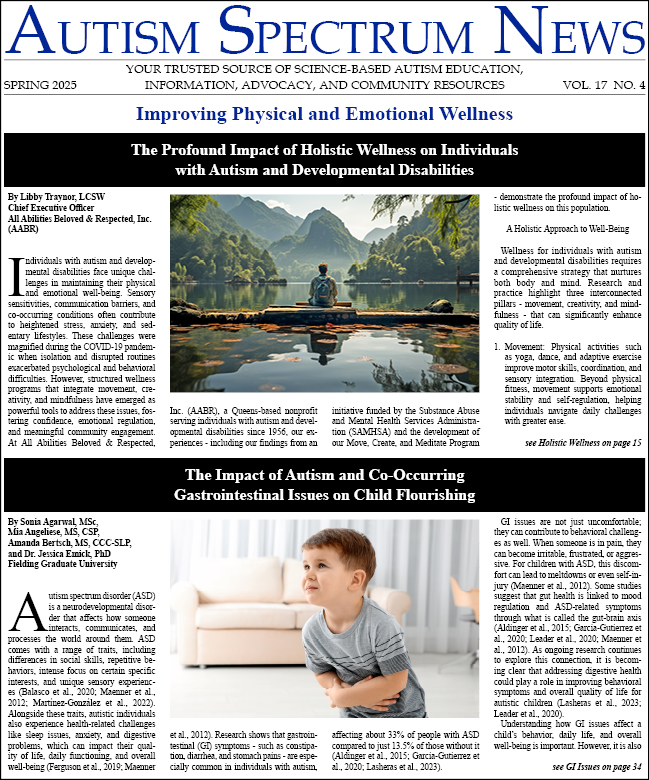“Improving Physical and Emotional Wellness”
View as a Flipbook View as a PDFAbout This Issue
The Spring 2025 issue highlights strategies, resources, and expert insights designed to support the overall well-being of autistic individuals of all ages. Emotional and physical wellness are essential because they significantly impact overall health and quality of life, helping individuals manage stress effectively, maintain positive relationships, build self-esteem, and live fulfilling lives.
Topics include fostering healthy routines, managing sensory needs, and exploring the benefits of mindfulness, exercise, and nutrition. Additionally, this issue addresses navigating healthcare systems, improving access to wellness services, and promoting collaboration among healthcare providers, therapists, and educators.
Whether you’re a parent, caregiver, professional, or self-advocate, this issue aims to provide valuable information and inspiration to enhance wellness at every stage of life.
Articles in This Issue
Improving Physical and Emotional Wellness
A Visual System Promotes Fitness, Self-Efficacy, and Independence for Adults with Autism
A Wellness Incentive to Empower Health and Community
* Beyond Picky Eating: Supporting Lifelong Health in Autistic Children
Breaking the Cycle of Food Selectivity: How MEAL PlanR Supports Autistic Children and Their Families
* Embracing Disability as Key to Autistic Well-Being
Empowering Safety: A Foundation for Physical Health and Emotional Wellness for Autistic Individuals
Managing Anxiety: Tools and Strategies for Emotional Balance
Mindfulness and Meditation Practices for Stress Reduction
* Navigating Autistic Shutdown and Burnout Through a Neurodiversity-Affirming Approach
* Navigating Health as an Autistic Picky Eater
* Preventing the Hidden Burnout Crisis in Autistic Women and Girls
Secrets to Achieving Physical, Emotional, and Mental Wellness for Individuals with Autism and/or IDD
SMART Homes, Meaningful Lives: Incorporating Wellbeing Practices into Independent Living Supports
The Impact of Autism and Co-Occurring Gastrointestinal Issues on Child Flourishing
The Importance of Fitness Training for Autistic Individuals
The Importance of Outdoor Recreation: A Pathway to Wellness and Skill Development
The InsideOut Program: Promoting Fitness and Friendship in College Students
* The Power of Accountability in Autism and Wellness
The Profound Impact of Holistic Wellness on Individuals with Autism and Developmental Disabilities
Wellbeing Over Standardization: A Better Approach to Clinical Training
Addiction and Mental Health
Autism and Gambling: Understanding Risks and Interventions
Assessment and Diagnosis
* Why Don’t Autistic Women Get Diagnosed, and Why Is It So Important?
Autistic Self-Advocates
* Autistic Lived Experience: Compromised by Neuropsychological Malpractice
* Finding Independence and Advocacy: A Journey Through Autism and Self-Direction (2021-2025)
* The Gulf Coast Burnout Queen
* The Role of Virtual Reality in Autism Therapy: Recent Advancements
* Through Distorted Lenses: The Unacknowledged Impact of Visual Perception Differences in Autism
* When the Caregiver Role Reverses: Navigating Caregiving as an Autistic Person
Communication
Enhancing Communication: The Case for Teaching Public Speaking Skills to Autistic Individuals
Employment
Family, Parents, and Caregivers
Building Resilience Through Self-Care and Support Teams During Divorce Transitions
Relationships
Neurodiverse Couples: Making Meaningful Moments of Every Day – Having A Good Evening
Services, Treatments, and Interventions
Building Effective Autism Treatment Plans: A Collaborative and Compassionate Approach
* Indicates an article written by an Autistic Adult






